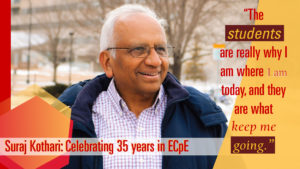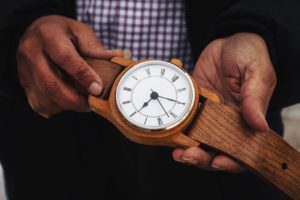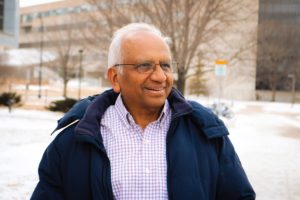
Thirty-five years with Suraj Kothari
Suraj Kothari, Professor at Iowa State University, is no stranger to the Department of Electrical and Computer Engineering. In fact, Kothari is celebrating 35 years affiliated with ECpE at Iowa State — and 20 as a full faculty member in the department.
In 1984, Kothari moved to Iowa after graduating from Purdue University with a degree in mathematics, and then teaching at multiple universities. He accepted a position in the Department of Computer Science at Iowa State, where he worked until 2000 as a full computer science faculty member and an adjunct faculty member for ECpE. Sixteen years later, the positions switched and Kothari became a full ECpE faculty and an adjunct in computer science.
Throughout his time in Ames, Kothari has made many contributions to not only the department, but to society as a whole. Kothari started his own company tackling software system complexity, called EnSoft Corp., founded in 2002.
Working at Iowa State between two departments for 35 years, one would see that Kothari has become extremely passionate about his research. Kothari has worked on projects with a total of $10,000,000 from 2012 to 2019, worked a lot with the Department of Defense and has been working on his MRI-related research ever since 2000. But while Kothari says he loves his research, he seems to care about something else a lot more: his students and the memories he has with them throughout the years.
“My memories are all associated with how I have impacted students and how their lives got impacted,” Kothari said. “All of my favorite memories in ECpE are with the students.”
Many students have touched Kothari’s heart with their strong work ethic, driven dreams and bright ideas. Kothari recollected a memory with an undergrad student he met in 2003, just three years after becoming a full ECpE faculty member.
“I had an undergrad student in my class years ago, and he was doing very well in my course, but I found that he did not have a job because his GPA was very low,” Kothari said. “But he was excellent, so I selected him as a TA, and he was doing a very good job, but he still could not get a job because of his GPA, and recruiters would not consider him.”
Routinely, recruiters would come to Iowa State like they do today, and this time, Kothari told the recruiters that while his student may not have a perfect GPA, what is more important is his stellar work ethic.
“I told the recruiters that his GPA doesn’t reflect his work. They hired him, and five years later, the same recruiter told me that he was one of their best hires from ISU,” Kothari said.

After those five years, Kothari received a handmade, carved wooden watch from this undergrad student. The student’s father was a carpenter, and he created this wooden watch in honor of Kothari and his faith in the student.
Another one of Kothari’s students is now the Chief Technology Officer (CTO) of his company, EnSoft.
“The company I started, EnSoft, I started with my undergrad RA,” Kothari said. “This person, at that time, was a freshman or second-year student in electrical engineering and physics. He was doing a double major.”
After they began working together, Kothari immediately noticed that he was very intelligent, but did not go down the career path most people expected.
“This undergraduate student began working with me, an extremely smart guy,” Kothari said. “But, he never finished his undergraduate degree. He dropped out toward the end of his degree path. I told him he should have a degree in hand, but he said he really just didn’t care. And in his case, it doesn’t matter whether he has a degree or not. Today, he travels all over the world and is the chief technology officer for the company.”
Both of these experiences taught Kothari a lesson: to keep an open mind, and that sometimes, it’s not about the words on a diploma or transcript.
“Just because you don’t have good grades doesn’t necessarily mean that you can’t do things, or that you have a bad work ethic, or that you aren’t smart,” Kothari said.
Kothari has taught many classes in ECpE, the software engineering and computer engineering ones being his favorite. And many of his students remember him.
After reaching out to five of Kothari’s past students, every single student replied, reiterating how Kothari changed their academic experience.
Hung Nguyen, a former ECpE student from the class of 2016, now works at Google in England. Without Kothari, he says he wouldn’t be where he is today.
“It is not an overstatement to say that without Prof. Kothari, I wouldn’t be where I am today,” Nguyen said. “While being a warm person, Prof. Kothari is also direct with his students. He once asked me to rewrite nearly an entire section of my thesis, but I didn’t complain because I knew he was helping me to do better. In fact, during my years at Iowa State, I have known first hand several other students who were having a difficult time with research, came to Professor Kothari, completed the program successfully, and then continued to have a successful career afterwards.”
Curtis Ullerich, a first-generation student from small-town Iowa, was initially struggling in one of Kothari’s computer engineering courses. After working together with Kothari, Ullerich ended the class with an A. Now, he is a software engineer for Google.
“The pace and scope of the work gave me a glimpse of what real-world engineering was like and gave me a chance to make a real difference on a huge project, and I had that opportunity because he saw some potential in me and asked me to join his team,” Ullerich said.
Ben Holland, a student who pursued his doctorate degree with Kothari, says Kothari is a highly respected professional and even sometimes appears as a father figure to him.
“Dr. Kothari absolutely has changed my life for the better,” Holland said. “I cannot imagine where I would be without having spent the years working with him that I did after my master’s program. We have been through many ups and downs together. There were several challenging trials we overcame together that were technical, exhausting and at times even emotional, but in the end, always rewarding. He believes in doing the right thing, despite the repercussions and burdens that often come when the right thing and the easy thing are at odds.”
Jeremias Sauceda and Ahmed Tamrawi are former students of Kothari’s who both work for EnSoft. Sauceda, the student who is now the CTO of EnSoft, said, “Kothari models gentle yet uncompromising ethics. I learned a lot about how to carry myself in the world through difficult situations from him.”
For Tamrawi, Kothari’s wise and caring persona inspired him.
“Throughout my Ph.D. journey, I have never felt that I have been treated as a student but rather as a researcher seeking answers and as a scientist with ideas worth discussing,” Tamrawi said. “Besides the wide knowledge that I have gained and the many challenging problems we have tackled, Dr. Kothari helped to shape my future by making me a critical and abstract thinker and persistent to achieve my goals.”
 To Kothari, students are what keep him young. While many students say they wouldn’t be where they are today without him, Kothari says he wouldn’t be where he is today without them.
To Kothari, students are what keep him young. While many students say they wouldn’t be where they are today without him, Kothari says he wouldn’t be where he is today without them.
“The students are really why I am where I am today, and they are what keep me going,” Kothari said. “What I feel is, as you grow older, your thinking gets kind of rigid. But when you meet all these young people here, they aren’t thinking about how they are going to get a promotion, or those things. Like my student that didn’t finish his undergrad degree, they aren’t thinking about those things. I think it keeps me young in thinking, meeting and talking to all these young people.”
While interviewing Kothari, when sharing his passion for helping students grow, he truly shined, more than when talking about his awards, research achievements or recognitions. It is clear that to him, no matter a student’s score on paper, he is always striving to encourage them to be their best and follow the paths they dream of. And together, they teach and learn from each other.
“Whatever you write, I want a takeaway to be my good memories with students and how we have impacted each other’s lives,” Kothati said. “That’s what I really would love to be known.”